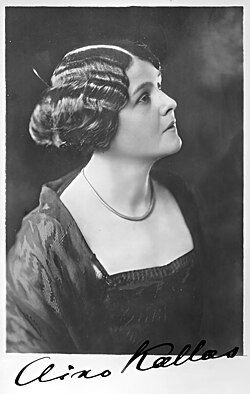 Aino from the Kalevala by Sigfrid Keinänen, 1876. | |
| Pronunciation | Eye-no |
|---|---|
| Gender | Feminine |
| Language | Finnish, Estonian, Japanese |
| Origin | |
| Meaning | "only" |
| Other names | |
| See also | Aina |



Aino is a feminine given name used in Finland, Estonia, and Japan.
Contents
The name Aino, meaning "the only one" in Finnish, was devised by Elias Lönnrot, who compiled, from surviving oral folk sources which he had collected, the Kalevala . In this epic poem, Aino is a beautiful girl who seems to wish to drown herself rather than marry the elderly Väinämöinen. Later in the story, she is unexpectedly lost in the water while bathing in a strange, unknown lake. In the original poems, she is mentioned as "the only daughter" (ainoa tyttö). [1]